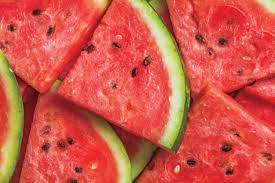Scientists at the Kwame Nkrumah University of Science and Technology (KNUST) have warned that children are at a higher risk of developing cancer by consuming watermelon.
This comes after their findings revealed unacceptable levels of pesticide residues like DDT in watermelon on the market in the Mampong Municipality of the Ashanti Region.
Although the organochlorine pesticides are banned for agricultural use, some farmers are using them, a situation which has adverse health effects on consumers.
In an interview with JoyNews, on Thursday, the lead scientist, Prof Nathaniel Owusu Boadi, revealed that since children consume the fruit more, they stand the risk of developing cancer.
“We looked at three of them; banana, pineapple and watermelon. For watermelon, the risk of consumption for adults was low, whereas that for infants was alarmingly high.
“We say alarmingly high because the factor that we got was far greater than one, which means that it is alarming. Also, when we looked at the carcinogenic risk, we also realised that the children are at risk of having cancer by consuming watermelon because of the level of organochlorine pesticide that was found [in the fruit],” he explained.
The scientists assessed the levels of organochlorine pesticide residues in fruits and determine the potential risk associated with the exposure to these pesticides.
For the study, the researchers used about 120 fruits from five communities in the Mampong Municipality of the Ashanti Region.
The results showed that although the levels of the pesticides were undetectable in bananas and pineapples, they were above the permissible limits in watermelons, which pose long-term risks to the consumer, especially children.
“Levels of methoxychlor, Aldrin and gamma-hexachlorocyclohexane (HCH) exceeded the maximum residue limits in watermelon.
“Estimated health risk revealed that Aldrin in watermelon could pose potential toxicity to the consumer. Estimated average daily intake for Aldrin was above the acceptable average daily intake.
“The combined health risk due to consumption of each fruit variety was minimal but, the overall health risk index due to consumption of all the fruits was higher than 1, indicating potential health risk to consumers,” the researchers added.
They have called for a regular monitoring of pesticide residue in fruits and the appropriate actions taken to protect consumer health.
Latest Stories
-
Town council in Canada at standstill over refusal to take King’s oath
26 mins -
Trump picks Pam Bondi as attorney general after Matt Gaetz withdraws
38 mins -
Providing quality seeds to farmers is first step towards achieving food security in Ghana
49 mins -
Kenya’s president cancels major deals with Adani Group
2 hours -
COP29: Africa urged to invest in youth to lead fight against climate change
2 hours -
How Kenya’s evangelical president has fallen out with churches
2 hours -
‘Restoring forests or ravaging Ghana’s green heritage?’ – Coalition questions Akufo-Addo’s COP 29 claims
2 hours -
Ensuring peaceful elections: A call for justice and fairness in Ghana
3 hours -
Inside South Africa’s ‘ruthless’ gang-controlled gold mines
3 hours -
Give direct access to Global Health Fund – Civil Society calls allocations
4 hours -
Trudeau plays Santa with seasonal tax break
4 hours -
Prince Harry jokes in tattoo sketch for Invictus
4 hours -
Akufo-Addo commissions 200MW plant to boost economic growth
4 hours -
Smallholder farmers to make use of Ghana Commodity Exchange
5 hours -
I want to focus more on my education – Chidimma Adetshina quits pageantry
5 hours

